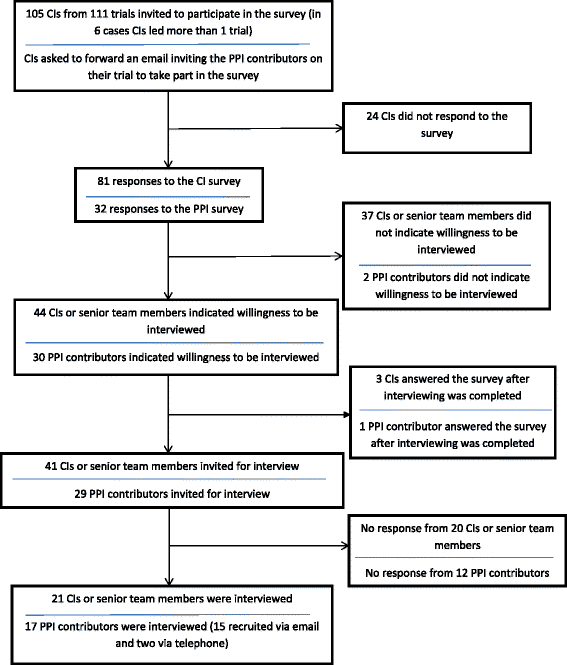A little more conversation please? Qualitative study of researchers' and patients' interview accounts of training for patient and public involvement in clinical trials
- PMID: 25928689
- PMCID: PMC4410574
- DOI: 10.1186/s13063-015-0667-4
A little more conversation please? Qualitative study of researchers' and patients' interview accounts of training for patient and public involvement in clinical trials
Abstract
Background: Training in patient and public involvement (PPI) is recommended, yet little is known about what training is needed. We explored researchers' and PPI contributors' accounts of PPI activity and training to inform the design of PPI training for both parties.
Methods: We used semi-structured qualitative interviews with researchers (chief investigators and trial managers) and PPI contributors, accessed through a cohort of clinical trials, which had been funded between 2006 and 2010. An analysis of transcripts of audio-recorded interviews drew on the constant comparative method.
Results: We interviewed 31 researchers and 17 PPI contributors from 28 trials. Most researchers could see some value in PPI training for researchers, although just under half had received such training themselves, and some had concerns about the purpose and evidence base for PPI training. PPI contributors were evenly split in their perceptions of whether researchers needed training in PPI. Few PPI contributors had themselves received training for their roles. Many informants across all groups felt that training PPI contributors was unnecessary because they already possessed the skills needed. Informants were also concerned that training would professionalise PPI contributors, limiting their ability to provide an authentic patient perspective. However, informants welcomed informal induction 'conversations' to help contributors understand their roles and support them in voicing their opinions. Informants believed that PPI contributors should be confident, motivated, intelligent, focussed on helping others and have relevant experience. Researchers looked for these qualities when selecting contributors, and spoke of how finding 'the right' contributor was more important than accessing 'the right' training.
Conclusions: While informants were broadly receptive to PPI training for researchers, they expressed considerable reluctance to training PPI contributors. Providers of training will need to address these reservations. Our findings point to the importance of reconsidering how training is conceptualised, designed and promoted and of providing flexible, learning opportunities in ways that flow from researchers' and contributors' needs and preferences. We also identify some areas of training content and the need for further consideration to be given to the selection of PPI contributors and models for implementing PPI to ensure clinical trials benefit from a diversity of patient perspectives.
Figures
References
-
- National Health and Medical Research Council and Consumers’ Health Forum of Australia. A Model Framework for Consumer and Community Participation in Health and Medical Research. Canberra: Australian Government; 2005.
-
- Canadian Institutes of Health Research, Natural Sciences and Engineering Research Council of Canada, Social Sciences and Humanities Research Council of Canada: Tri-Council Policy Statement: Ethical Conduct for Research Involving Humans. http://www.pre.ethics.gc.ca/pdf/eng/tcps2/TCPS_2_FINAL_Web.pdf. Accessed 28 July 2014.
-
- Department of Health . Best research for best health: a new national health research strategy. London: Department of Health; 2006. - PubMed
Publication types
MeSH terms
Grants and funding
LinkOut - more resources
Full Text Sources
Other Literature Sources


